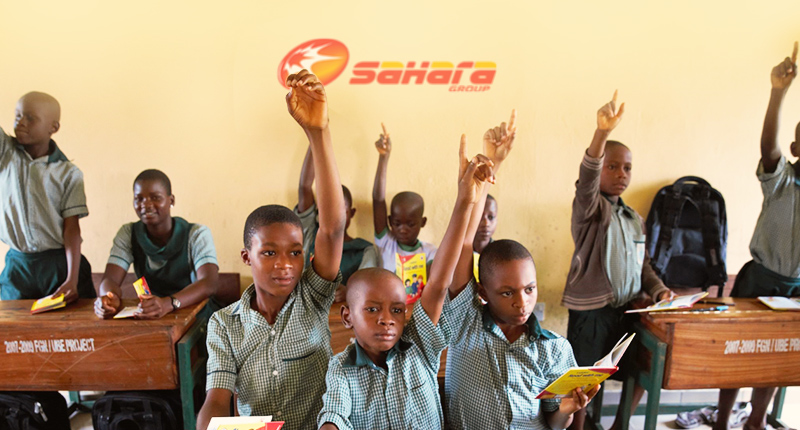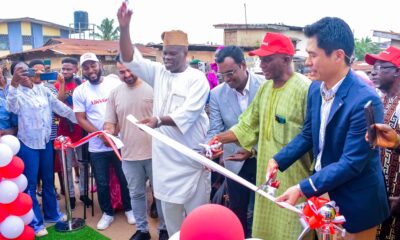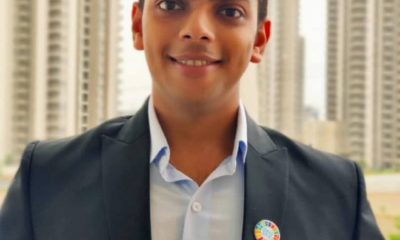NGOs - SDGs
Sahara Group: Inverting Narratives Through Sustainable Development

Lagos, Nigeria – As a multinational organization, Sahara Group’s partnership with the UN on Sustainable Development Goals (SDGs) is an affirmative response to a universal call to action. It is a mandate to end poverty, protect the planet and ensure that all people enjoy peace, self-determination and prosperity.
The SDGs are globally acknowledged as a robust road map for social development. Our foundation exists to ensure that our business activities are underpinned by sustainable development actions both now and in the future. Sahara Foundation works consistently with Sahara Group to ensure that the SDGs are intrinsic to and influence the strategy for every one of our businesses.
SDGs are good for commercial operations and sustainability is important to the process design, strategy, succession planning and viability of any organization.
Incorporating the SDGs into our businesses gives us the capacity to thrive as a sustainability driven going concern today, whilst also laying the foundations by which the engines of our success are fully functioning in the future.

Our work as a steward for sustainability with Vision of Hope in Lusaka, Zambia and Pugu Secondary School in Dar-es-Salaam, Tanzania are just two examples of how we partner to provide capacity building opportunities to some of the most vulnerable and marginalized groups in Sub-Saharan Africa.
Goals 3 (Good Health and Well Being) and 6 (Clean Water and Sanitation) are central to our work with Vision of Hope. By providing access to health care and sanitation and building an industrial size kitchen which allows for large scale cooking in sanitary conditions we are able to create an environment in which the young denizens and the adults who look after them are well fed and well nurtured.
We also partner assiduously to achieve goal 4 (Quality Education) by providing the means and a space for a formal education.
Vision of Hope has become a safe space and a social sanctuary for girls from as young as ten months to eighteen years. It enables young mothers go to school or take up an apprenticeship in arts and craft whilst their infants and toddlers are looked after during those important educational or vocational hours.
Over the years, it has become apparent that the underscoring of a successful partnership is the ability to identify gaps in social development, align with capable collaborators and deftly combining resources to fill those gaps in a manner that is timely and via sustainable means and methods.
At Pugu Secondary the foundation has been able to shift the narrative positively by working in concert with the local community on gender equality and quality education. This partnership has bridged the gender equality gap by giving female students access to restroom facilities that enable them have uninterrupted time in school thus furthering their education and improving their life chances.

Prior to installation of new toilet facilities a lot of young girls were unable to attend classes during their menstrual cycles because there were no conveniences designed to accommodate them. This lowered the attendance rates of female students whilst their male counterparts continually enjoyed the social advantages of a steady education.
The conveniences provided have significantly narrowed the gap by improving female classroom attendance across the year and leveling the playing field for these bright young girls as they grow into adolescence.
Our work as a partner on social development is effective largely because of the opportunity to work with a rich network of international multilateral agencies. As a member of the board of both local and global PSAGs (Private Sector Advisory Groups) and a strategic partnership with the office of the Deputy Secretary General of the United Nations we are able to work with NGOs, governments and the private sector to design solutions for some of the most urgent challenges to global sustainable development.

Additionally, as a steering committee member of the Partnering Against Corruption Initiative (PACI) of the World Economic Forum we are working to design corruption out of the societies and countries in which it is impeding economic growth and the creation of generational wealth. Our work with PACI has allowed us to address goals 8(Decent Work and Economic Growth) and 16 (Peace, Justice and Strong Institutions) across various borders and business interests.
The inexorable spread of globalization has also increased awareness about the importance of preserving the planet and being accountable for our individual and collective actions as global citizens.
More will be demanded of businesses by regulators, host communities, governments and employees. Businesses which espouse corporate citizenship and predicate decisions based on a social purpose will rightly be rewarded with patronage from socially conscious consumers.
Sahara is gratified to utilize its agency and partner with a cross section of multiple stakeholders (Goal 17: Partnerships to achieve the goal) in identifying gaps, bridging them and inverting negative narratives on the state of global sustainable development now and in future.
Credit: Sahara Group
NGOs - SDGs
Mercy Ships and Mission Aviation Fellowship renew partnership to bring life-changing surgery to African patients

Mercy Ships and Mission Aviation Fellowship Team (Image: Supplied).
Humanitarian aid organizations Mercy Ships and Mission Aviation Fellowship (MAF) have renewed their partnership to help bring life-changing surgical care to isolated communities across Africa.
Mercy Ships operates state-of-the-art hospital ships, providing free surgeries and healthcare services to sub-Saharan nations with limited access to safe surgical care. MAF’s purpose is to bring help, hope and healing through aviation to people living in isolation and poverty.
The renewed memorandum of agreement between these two faith-based charities enables Mercy Ships to extend their reach further inland to a broader spectrum of the population across Africa, bolstered by MAF’s logistical support. This partnership, launched in Madagascar, will enable teams to access hard-to-reach areas and transport patients in need of critical surgical interventions. This collaboration provides opportunities for those in the most remote and inaccessible regions of the country. Further joint initiatives are being explored in other African nations.
“Traveling by road in Madagascar can be incredibly challenging due to the rough terrain and poor infrastructure,” Michael Jurgensen, MAF Madagascar Country Director, said. “In many cases, reaching remote villages can take days by car, draining valuable time and energy. However, with MAF Madagascar’s support, the [Mercy Ships] patient selection team can cover vast distances swiftly and safely, enabling them to visit multiple locations within a short period. Flying not only saves time for the selection team, but also ensures the team can travel to evaluate and select patients from the most isolated and underserved areas for surgery on-ship at a later date.
A 2016 study of Madagascar revealed that only 20% of the population can access surgical services within a two-hour timeframe, and up to 95% would face financial ruin if they required surgery (source: BMJ Global Health). With a scarcity of surgeons — approximately 1 for every 100,000 people — the prospect of receiving necessary surgical treatment seems unattainable for many (source: WHO).
Bernard van den Bosch, who has worked for both MAF and Mercy Ships, and current Director of the Africa Services Center at Mercy Ships, expressed his enthusiasm: “We are confidently re-engaging with MAF because together we are stronger. The country of Madagascar has many hard-to-reach areas, and MAF is the key to accessing them. Non-profit organizations can ‘compete,’ but ultimately, we all serve the same goal. I see many opportunities for future collaboration and intensive joint efforts.”
Bastiaan de Waal, Africa Regional Director of MAF, added: “By transporting Mercy Ships teams with our aircraft to the interior of Madagascar, we provide help, hope and healing to residents with the surgical care they desperately need. The need is high in these areas, and these people in isolated communities are equally entitled to care. We are pleased to partner alongside Mercy Ships to support this often-forgotten group. Being each other’s hand and foot is what we are called to do and we have a shared synergy of vision and values.”
This renewed collaboration between MAF and Mercy Ships exemplifies how strategic partnerships can enhance humanitarian efforts, ensuring that more people receive the critical medical care they need. The two organizations previously partnered from 2014 to 2016 in Madagascar and have worked together in Liberia.
Mercy Ships’ hospital ship, the Africa Mercy®, has been docked in Toamasina since February and is delivering surgery and training. The ship is actively collaborating with Madagascar’s Ministry of Health to identify the most pressing needs and strengthen the country’s surgical systems through its education, training, and advocacy program.
NGOs - SDGs
Climate Launchpad: Beyond competition, a catalyst for change

Climate Launchpad Competition 2023 Image.
Despite the success of The Climate Launchpad Competition 2023, Climate Launchpad through the support of Climate-KIC and Irish Aid provided additional support to the participants of the competition through the Post-Climate Launchpad Accelerator. Given that the majority of the participants are early-stage businesses, capacity building is a necessity. The post-competition support is divided into 2, The masterclasses that are being handled by the Climate Launchpad Global team which has participants from over 7 African countries, and The national capacity-building session handled by the Climate LaunchPad Nigeria Team.
The Masterclass session featured a business-changing session on important modules like funding options & Instruments, Gender and Climate, Communications and Storytelling, Climate Impact etc. The national capacity-building session focuses on marketing strategies, practical and optimal use of social media and analytics. As an early-stage business in Nigeria, one of the major challenges you face is reaching and communicating with your potential customers at the market entry stage. The modules were selected after feedback from alumni of the competition.
The modules have been proven to be useful as we have started seeing the tractions of the businesses on social media. Overall, the post-competition support program has been no short of helpful to the businesses. We had 5 active participants from Nigeria who have expressed their gratitude for the post-competition support. Each of them will be given a grant of EUR200 to facilitate their marketing and social media usage.
The National Lead for Climate Launchpad Nigeria, Oluwatosin Ajide affirms the importance of the accelerator program “If we have more competition dedicating their support beyond just the pitching like Climate Launchpad does, We would have more green businesses with solid foundations”. He also thanked the Climate Launchpad central team and the sponsors the Climate-KIC and Irish Aid for their constant support in building the green ecosystem in Nigeria.
NGOs - SDGs
GEANCO Foundation and Archewell Foundation Announce Mental Health Initiative for Nigerian Youth

The GEANCO Foundation and The Archewell Foundation has announced an expansion of their partnership, currently serving girls and young women across Nigeria with menstrual health products and education, to include mental health resources and training for young men and women.
This expanded partnership kicked off with its inaugural Mental Health Summit, taking place over two days and serving nearly 200 students in Abuja, Nigeria’s capital. Prince Harry and Meghan, The Duke and Duchess of Sussex and co-Founders of The Archewell Foundation opened the Summit by delivering inspiring remarks to the young people in attendance.
GEANCO intends to hold summits throughout the country over the next year, providing teenage girls and boys with the information, skills, and coping mechanisms necessary to flourish mentally.
“Youth in Nigeria are critically underserved in terms of mental and menstrual health”, said GEANCO’s CEO Afam Onyema. “I am deeply grateful to The Duke and Duchess for partnering with us to address this crisis and provide this vulnerable but inspiring young generation with what they need to thrive in body, mind and spirit.”
A strong stigma also surrounds mental health in Nigeria, which is critically neglected in the country. The World Health Organization estimates that only 3% of the federal government’s health budget goes to mental health, and while up to one-third of Nigerians have mental health challenges, fewer than 500 mental health professionals serve the country’s 200 million plus citizens. Nigeria’s teens and youth in particular have little to no access to mental health support.
The expanded partnership will also continue the ongoing work to support young girls with menstrual health products and education. An estimated 37 million women and girls in Nigeria experience “period poverty”, meaning they are unable to access or afford menstrual products like pads, tampons, and underwear. Because of the material difficulties caused by period poverty and the deep stigma surrounding menstruation, millions of girls in the country miss school every month, crippling their educational advancement and deepening Nigeria’s already vast levels of gender inequality.
GEANCO Foundation provides critical health care and education services in Nigeria. Its David Oyelowo Leadership Scholarship provides full tuition, medical care, and social and emotional support to young female victims of terrorism and gender inequality in Nigeria.
-

 Afripreneur14 hours ago
Afripreneur14 hours agoRedefining Real Estate Marketing: An Interview with Imelda Usoro Olaoye, Founder of Thinkmint
-

 Afripreneur13 hours ago
Afripreneur13 hours agoOluchi Anoruo on building SmartPharm and addressing access to healthcare products
-

 Economy18 hours ago
Economy18 hours agoMeta Hosts its First Youth Summit in Nigeria to Drive Innovation and Empowerment
-

 Technology18 hours ago
Technology18 hours agoLG’s Brand Reinvention: A Global Success Story

















